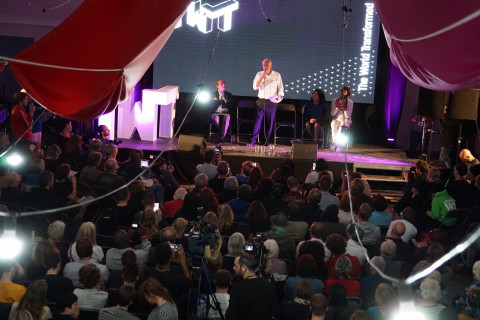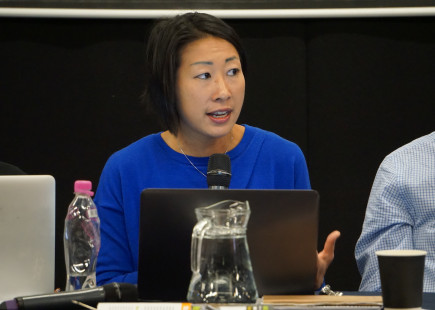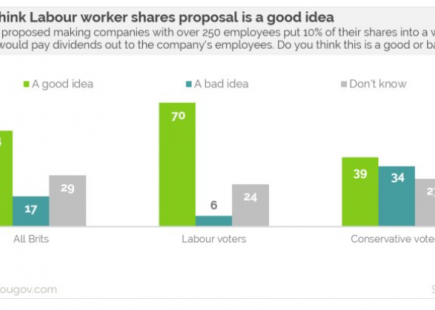A beginner’s guide to the core of UK Labour party politics today If you’re not excited, you’re not paying attention
Regions
The UK's labour party is inspiring grassroots and workers mobilisation and showing increasingly credible leadership. Its recent annual conference and the concurrently run World Transformed Festival give hope.

Jess Graham
For four days last week, I was more excited than I have been in a while. I was in Liverpool, UK for the World Transformed Festival (TWT). The festival runs parallel to the annual Labour party congress. While I saw only a relatively small part of the entire picture, I am convinced that the inspiring grassroots and workers mobilisation around Labour party politics and the solid leadership of Jeremy Corbyn, should be shared with an international audience.
I’ll begin with the last session of TWT on Tuesday night. I managed to sneak in even though the auditorium was so full a volunteer (so many committed volunteers made TWT happen) had tried to stop me. There was barely room to stand. But I wanted to hear MP John McDonnell and MP Rebecca Long Bailey. With their roles in Corbyn’s Shadow Cabinet, covering the Exchequer and Industrial strategy respectively, they are at the helm of Labour’s economic policies. The session was organised by the Socialist campaign group of the Labour party, the people who successfully fought for Jeremy Corbyn’s leadership in 2015, beating the neoliberal ‘Third Way’ politics that dominated Labour for two decades. The session was an outpouring of energy, passion, joy, hope, commitment and desire for change more than a political debate. All MPs on the stage called for a socialist Labour party, and all were committed to working with workers, for workers, and the people and communities most heavily impacted by austerity policies. The rallying cry resounded, ‘Rebuild Britain for the many, not the few’.
TWT is organised by “Momentum”, in collaboration with many other progressive organisations. Momentum – a decentralised political movement allied to the Labour party – have backed a socialist agenda in the Labour party for years. Their mobilisation and the advent of Corbyn’s leadership are inseparable. As I heard from Sylvia Jones, one of the founders of the Bristol chapter of Momentum, who I met on the way in to one of the sessions, the TWT created a genuine space for a very broad range of progressive organisations, from unions to solidarity groups. Many Labour MPs engaged with TWT debates, while TWT participants also joined the party congress. Organisers ensured that all venues were within walking distance. The first TWT was organised in 2015, making this year’s edition the third.
I pay tribute to the organisers of the fantastic World Transformed Festival. The campainging work of our grassroots members has inspired millions, their commitment will carry this party into power and it will sustain our socialist government when we get there. pic.twitter.com/PsdXnD5uj7
— John McDonnell MP (@johnmcdonnellMP) September 25, 2018
Two new policy commitments from the Labour party attracted participants’ and media attention. The first is to take back public control over essential industry and services such as water, energy, mail and the railways. This can be best described as renationalisation, a part of the Labour party manifesto ahead of the 2017 general election. It has proven extremely popular among voters, contributing to Labour’s growing support.

Jess Graham (TNI)
John McDonnell’s speech at the Congress on Monday 24th did not therefore come as a surprise. He said ‘some may accuse us of looking to the past for solutions, but we have always been clear that public ownership of key services is about handing economic power back to workers, citizens and communities to a degree that has never been seen before.’ The proposal has become much more concrete, detailing how to rebuild the public water system, how to transform the private water companies into nine public water companies authorities with democratic structures and subject to public scrutiny. If they are realised, they will be potentially the most ambitious public water companies in terms of democratic accountability and participation. Incidentally, England is one of the few countries in the world to fully privatise water. The energy market is not much different, as it is dominated by six large transnational corporations.
John McDonnell says a Labour government would nationalise water, energy, Royal Mail and rail
Follow the Shadow Chancellor's #Lab2018 speech here: https://t.co/xsOzFQfauG pic.twitter.com/fnEng5B1qa— Sky News Politics (@SkyNewsPolitics) September 24, 2018
Since the manifesto was released, many activists, experts, and academics have collaborated with the respective Labour party committees to give shape to its stated policies. This experiment, to develop policies with activists and experts outside of the party, has infused it with energy, and shaken up the dynamics of the current Labour party in a positive way.
In addition, McDonnell and Long Bailey released a new consultation paper on democratic public ownership, to invite ideas and learn from the experts on the ground, and the experiences of people on the frontline. I am not a British voter nor is TNI based in the UK, but we can still engage with and contribute to collective knowledge building. This is innovative.
The second policy commitment came as a real surprise for many, including me. In the same speech, McDonnell announced that Labour will legislate for the creation of an Inclusive Ownership Fund (IOF). This legislation would require private companies with more than 250 employees to transfer at least one percent (and up to ten percent) of their equity into an IOF each year, to share ownership with employees. The scheme, under which each worker would receive a maximum of £500 per year is primarily concerned with how to distribute a dividend to those who actually generate wealth.
I met Duncan McCann from the New Economic Foundation, who advocates for a state created and citizen owned Citizens' Wealth Fund and asked him about the differences with the IOF. He explained the main difference is that the IOF only benefits workers in big private companies. Students, pensioners, the unemployed, and public workers are not included in such a scheme. The IOF can be seen as the first step to distribute private wealth to society, Duncan said. Any further dividends in excess of the maximum £500 payable annually would go to a national fund, which is estimated to reach £2.1bn a year, according to the Labour party. It can then be used to finance public services. This proposal is popular even among Conservative party voters (See graphic below).

yougov.com
Sceptics rightly point out that political parties, especially those in opposition, will say almost anything to gain support in the run up to an election. This is why an autonomous discussion space like TWT is critically important. There were many in-depth debates about how to build an inclusive economy and how to create democratic public ownership. The content of the deliberations was concrete, and people saw a real opportunity for change if Labour wins the next election. Naturally, a lot of energy was spent on trainings and workshops on grassroots mobilisation and community organising. Art exhibitions, film screenings and other cultural activities made the TWT rich and attractive for a broad audience.
TWT dealt with much broader issues too, which are not (yet) necessarily priorities for the party–what to do with the banks, for instance. 2018 marks ten years since the last global financial crisis. The failures and risks of financial institutions continue to be borne by society, and necessary regulation has not happened. Extreme austerity policies and social cuts in the UK, the rest of Europe and worldwide were justified by neoliberal power. Political economist Ann Pettifor noted that the ‘financial sector has been powerful, consolidated, and guaranteed as ever’ at a TWT session on finance.
The Labour party, while talking about regional public development banks that should invest in the real economy, have not said concretely how to tackle the financial power centred on the City of London.
Michael Boberts, who worked in the City of London as an economist, was terribly angry that the banks don’t work for people and the real economy, but instead serve big corporations, financial markets, and shareholders. According to Boberts, only 5% of finance flows to the real economy, and the rest goes to financial markets and speculation. In this situation, establishing public banks is not enough. He argued that banking should be a public service, much like transport, and contended that it was not necessary to integrate all banks into one public national bank, but that the banking system should be democratically governed as a public service to force money to flow into the real economy. In the face of the extremely powerful and highly globalised finance sector, this will be an uphill battle that will require new perspectives and radical proposals for action.
Finally, Brexit. I felt the TWT consciously skirted this divisive issue while the Labour party congress, on the other hand, could not avoid it. The congress passed a motion stating, “If we cannot get a general election, Labour must support all options remaining on the table, including campaigning for a public vote.” Amid growing calls for a People’s Vote - a new referendum on Brexit - demanding a general election remains the priority, at least for the top leadership of the Labour party.
Business groups have, of course, attacked Labour’s socialist economic policies. This is no surprise, as their easy business environment and vested interests are at risk. I also heard criticisms from left-wing circles that the Labour party was neither radical enough nor international enough. In my opinion, it is very easy to critique, but one wonders if the radical left can afford to criticize, instead of supporting and uniting? Globally, what other political opportunities are there at national level where democracy and redistribution to workers are discussed to this degree? What other opportunities are this serious and credible? The current Labour party has truly created an historical opportunity to take on this extreme neoliberal system and tackle inequality. It opens new debates about what an economy for the many should look like.
I want to see the situation as an historical possibility. After all, I have seen in my lifetime the deterioration of welfare states, and my sons only know a neoliberal world. Young people today don’t know that housing could be affordable and have had few prospects except to dream of being part of the 1%.
As the British would say, I merely dare to dream about a politics centred around the interests of workers and ordinary people.
